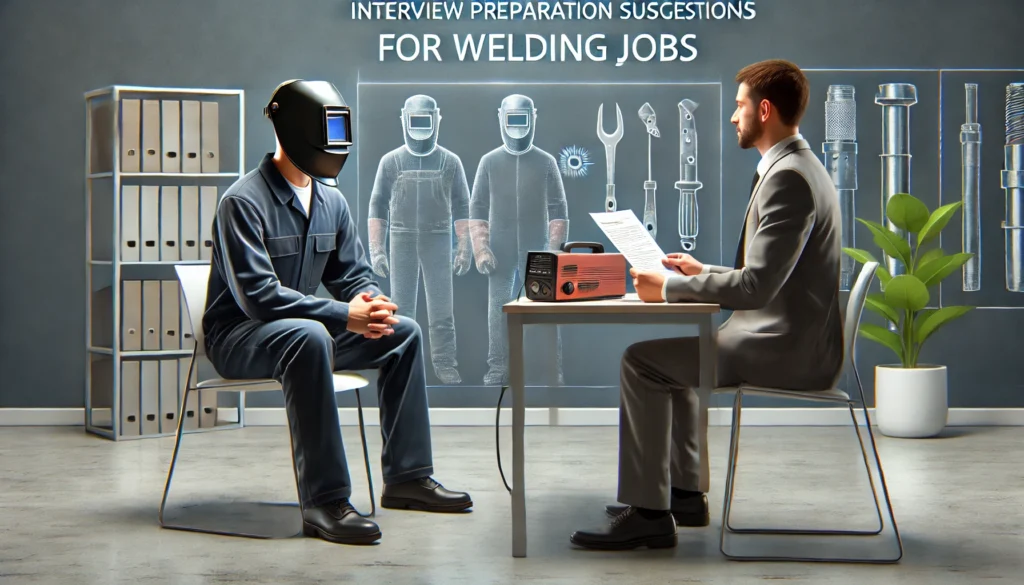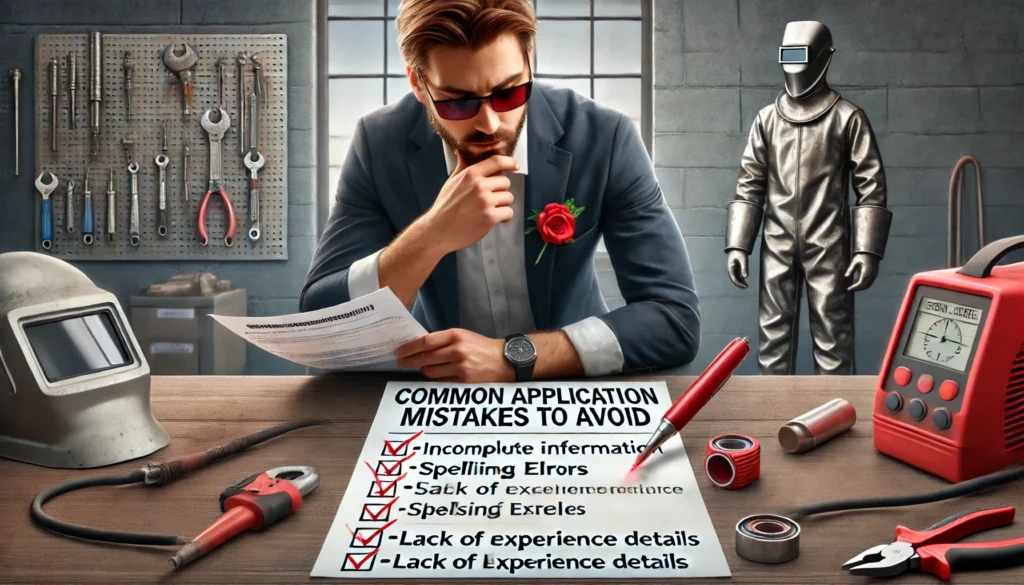
Table of Contents
Introduction
Did you know that welding professionals with specialized certifications earn up to 40% more than their standard-certified counterparts? As the manufacturing and construction industries evolve with technological advancements, the demand for skilled welders continues to grow significantly. In 2025, welding jobs are not just about traditional metal joining—they’re about mastering sophisticated techniques and embracing innovations reshaping the profession. Whether you’re a seasoned welder looking to advance your career or someone considering entering this robust field, understanding how to position yourself for the best welding jobs in today’s competitive market is crucial for professional success and financial growth.
Job Requirements List
Securing high-paying welding jobs in 2025 requires meeting specific qualifications that employers prioritize in their hiring decisions:
Essential Qualifications:
- High school diploma or GED (minimum educational requirement)
- Completion of an accredited welding training program or apprenticeship
- Active certifications from recognized organizations (AWS, ASME, etc.)
- Proficiency in multiple welding techniques (TIG, MIG, Stick, etc.)
- Working knowledge of blueprint reading and technical documentation
- Physical stamina and hand-eye coordination
- Safety training and awareness of industry regulations
Advanced Requirements for Premium Positions:
- Specialized certifications in high-demand areas (underwater welding, pipeline welding)
- Experience with automated and robotic welding systems
- Knowledge of metallurgy and materials science
- Proven track record with precision welding projects
- Computer skills for operating digital welding equipment
Alternative Qualifications Employers May Accept:
- Military welding experience in place of formal education
- Related trade experience (pipefitting, metal fabrication) with demonstrated welding aptitude
- Portfolio of personal welding projects showing technical competence
- Completion of manufacturer-specific training programs
Application Timeline
Preparing effectively for welding jobs requires understanding the typical timeline from preparation to securing a position:
Preparation Phase: 1-3 months
- Obtaining necessary certifications: 2-8 weeks, depending on program intensity
- Building portfolio of work samples: 2-4 weeks
- Researching target employers and positions: 1-2 weeks
- Resume and application materials preparation: 1 week
Application Phase: 2-6 weeks
- Job search and submission of applications: Ongoing
- Initial employer responses: 1-3 weeks
- Pre-employment welding tests: Scheduled within 1-2 weeks of initial response
Interview Process: 1-4 weeks
- Initial interviews (phone/virtual): 1-2 weeks after application review
- Technical interviews and practical demonstrations: 1-2 weeks after initial interview
- Final interview and job offer: 1-2 weeks after technical assessment
Total Timeline: 2-5 months
While the industry average hiring process for specialized welding jobs typically takes 3-4 months, candidates who follow our optimization strategies can potentially reduce this timeline by 30%, positioning themselves more effectively in a competitive job market.
Step-by-Step Application Process
Step 1: Identify Your Welding Specialty and Target Employers
Begin by assessing your welding strengths and the types of welding jobs that align with your skills and interests. Research companies that hire welders in your preferred specialty and learn about their requirements.
Pro Tip: Create a spreadsheet of potential employers with columns for company information, application requirements, and contact details of hiring managers. This organizational approach can increase your application efficiency by up to 35%.
Step 2: Optimize Your Welding Resume and Portfolio
Create a tailored resume that highlights your specific welding experience, certifications, and completed projects. According to resumetrick.com, personalizing your application materials significantly increases your chances of getting noticed:
- Begin with a strong opening paragraph mentioning the specific job you’re applying for
- Address your cover letter to the hiring manager by name when possible
- Include detailed information about your welding experience, certifications, and notable projects
- Develop a digital portfolio showing your best welding work with before/after photos
Pro Tip: Include metrics when possible, such as “Maintained a 98% pass rate on X-ray tests” or “Reduced rework by 15% through improved technique.”
Step 3: Prepare for and Pass Technical Assessments
Most premium welding jobs require passing practical welding tests that assess your technical abilities.
- Practice the specific welding processes mentioned in the job posting
- Familiarize yourself with the exact materials and positions likely to be tested
- Review relevant codes and standards (AWS, ASME, API, etc.)
- Prepare your tools if permitted by the testing facility
Pro Tip: Record yourself welding and analyze your technique, or ask an experienced welder to critique your work. This self-assessment approach improves test pass rates by approximately 25%.
Step 4: Ace the Interview Process
Prepare thoroughly for both technical questions and standard interview inquiries. Research shows that candidates who practice mock interviews are 40% more likely to receive job offers.
- Prepare specific examples that demonstrate your problem-solving abilities
- Be ready to discuss challenging welding projects you’ve completed
- Practice explaining technical welding concepts in clear, accessible language
- Prepare thoughtful questions about company operations and growth opportunities
Pro Tip: Research the company’s recent projects or contracts to reference during your interview, showing genuine interest and industry knowledge.
Salary Information
The welding profession offers varying compensation levels based on specialization, certification, location, and experience:
| Position Type | Entry-Level | Mid-Career | Experienced | Industry Leaders |
|---|---|---|---|---|
| General Welder | $40,000-$45,000 | $50,000-$65,000 | $70,000-$85,000 | $90,000+ |
| Pipe Welder | $55,000-$65,000 | $75,000-$85,000 | $90,000-$110,000 | $120,000+ |
| Underwater Welder | $80,000-$100,000 | $110,000-$140,000 | $150,000-$200,000 | $200,000+ |
| Welding Engineer | $65,000-$80,000 | $85,000-$100,000 | $110,000-$130,000 | $140,000+ |
| Welding Research Scientist | $70,000-$85,000 | $90,000-$110,000 | $120,000-$150,000 | $160,000+ |
According to weldingnearyou.com, Welding Research Scientists earn an average salary of $86,000, with significantly higher earnings possible with advanced experience and education.
Regional Variations: Welding salaries in metropolitan areas and regions with heavy industrial activity (Gulf Coast, Northeast) typically offer 15-25% higher compensation than national averages.
Alternative Career Paths
The skills developed for welding jobs can translate effectively to several related career paths:
Related Technical Positions:
- Welding Inspector: Leverage your technical knowledge to ensure quality and compliance
- Welding Educator/Trainer: Share your expertise with the next generation of welders
- Robotics Technician: Apply your welding knowledge to programming and maintaining automated systems
- Quality Control Specialist: Use your understanding of welding standards to ensure product quality
Entrepreneurial Options:
- Custom Fabrication Business: Create specialized metal products for residential or commercial clients
- Mobile Welding Service: Offers on-site welding repairs and installation
- Artistic Metal Design: Combine welding skills with creativity for decorative metalwork
According to LinkedIn.com, the welding industry is experiencing a technological revolution with innovations like AI, AR, VR, and advanced robotics. Professionals who adapt to these technologies will maintain a competitive edge in the evolving job market.
Interview Preparation Suggestions
Preparing thoroughly for welding interviews significantly increases your chances of landing premium welding jobs:

Technical Preparation:
- Study common welding test procedures in your specialty
- Review applicable welding codes and standards
- Prepare to explain your approach to quality control and safety
- Be ready to demonstrate your knowledge of different materials and their welding characteristics
Behavioral Preparation:
- Prepare specific examples demonstrating teamwork in challenging projects
- Develop clear explanations of how you’ve resolved welding problems in previous roles
- Practice articulating your career goals and how the position aligns with them
- Prepare questions that demonstrate your understanding of the company and industry
Mock Interview Strategy:
- Record practice interviews to analyze your communication style and body language
- Arrange technical discussions with experienced welders to sharpen your explanations
- Practice explaining complex welding concepts to non-technical people
Pro Tip: Prepare a small portfolio of weld samples or photographs to bring to in-person interviews, providing tangible evidence of your skill level.
Common Application Mistakes to Avoid
Even highly qualified welders can sabotage their chances at premium welding jobs by making these common mistakes:

Resume and Application Errors:
- Using a generic resume instead of tailoring it to specific welding positions
- Failing to highlight relevant certifications prominently
- Omitting quantifiable achievements and project outcomes
- Neglecting to proofread for technical accuracy and terminology
Interview Missteps:
- Showing limited knowledge about the company’s specific welding needs
- Failing to ask thoughtful questions about procedures, equipment, and expectations
- Understanding safety awareness and quality control experience
- Appearing inflexible about adapting to new welding techniques or technologies
Technical Assessment Failures:
- Inadequate preparation for specific welding tests
- Rushing through demonstrations rather than showcasing precision
- Neglecting proper safety protocols during assessments
- Inability to explain the technical reasons behind welding decisions
Pro Tip: According to industry hiring managers, candidates who demonstrate strong problem-solving abilities during technical assessments are 30% more likely to receive job offers, even when their welds aren’t perfect.
Career Growth Tips
Securing a welding position is just the beginning—maintaining career momentum in welding jobs requires ongoing development:
Continuous Skill Enhancement:
- Pursue additional certifications in specialized welding techniques
- Learn complementary skills like CAD/CAM software for fabrication
- Develop expertise with emerging technologies like advanced robotic systems
- Consider formal education in metallurgy, engineering, or related technical fields
Professional Networking:
- Join professional organizations like the American Welding Society
- Attend industry trade shows and technical conferences
- Participate in online forums and social media groups focused on welding innovations
- Build relationships with suppliers and vendors for industry insights
Leadership Development:
- Seek opportunities to mentor apprentices or new hires
- Volunteer for challenging projects that stretch your capabilities
- Develop communication skills to bridge technical and management perspectives
- Document improvements you implement to build a case for advancement
According to capitolironworksdc.com, welding engineers who focus on designing, developing, and improving welding processes can access significantly higher earning potential while leveraging their practical welding knowledge.
Conclusion
Securing the best welding jobs in 2025 requires a strategic approach combining technical excellence, specialized certifications, and adaptability to emerging technologies. By optimizing your application materials, preparing thoroughly for assessments, and continuously expanding your skills, you can position yourself for premium opportunities in this evolving field. The welding profession continues to offer excellent career stability and compensation, particularly for those willing to embrace specialization and technological advancement.
Ready to elevate your welding career? Try implementing these strategies in your next job application, and share your experiences in our comment section. Subscribe to JobFixe for more expert career guidance tailored to technical professions and ongoing updates on emerging opportunities in the welding industry.
FAQs
Q: What certifications offer the best return on investment for welders in 2025?
A: AWS certifications in specialized areas like aerospace (D17.1) and structural welding (D1.1) consistently provide the highest ROI, with certified professionals earning 20-30% more than their non-certified counterparts. Pipe welding certifications (6G position) are particularly valuable across multiple industries.
Q: How can I transition from general welding work to more specialized, higher-paying positions?
A: Start by identifying growing specializations that match your interests, then acquire relevant certifications while seeking smaller projects in that specialty to build experience. Consider apprenticing under specialists in your target field, even if it requires a temporary pay reduction for the learning opportunity.
Q: Is it worth investing in my welding equipment when applying for jobs?
A: While not necessary for entry-level positions, having personal high-quality equipment becomes increasingly valuable as you advance. For specialized welding jobs, demonstrating proficiency with your own properly maintained equipment can distinguish you from competitors and prepare you for potential independent contracting opportunities.
Q: How important is formal education versus practical experience in the welding field?
A: The welding industry still values hands-on experience significantly, but formal education is becoming increasingly important for advanced positions. For specialized welding jobs and leadership roles, a combination of formal education (associate’s degree or higher) and demonstrated practical expertise creates the strongest candidate profile.
Q: What’s the role of a welding engineer?
A: According to capitolironworksdc.com, welding engineers design, develop, and improve welding processes, equipment, and techniques. They research to enhance efficiency, quality, and safety in welding operations, making them vital to advancing welding technologies and standards.


